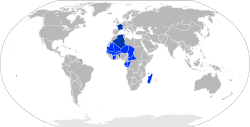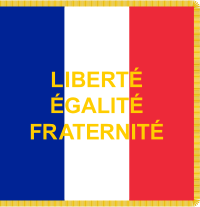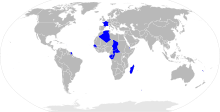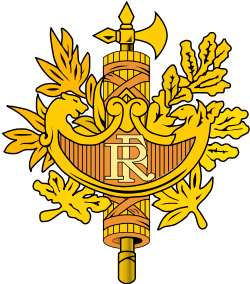French Community
| French Community | ||||||||
| Communauté française | ||||||||
| ||||||||
| ||||||||
| Motto "Liberté, égalité, fraternité" "Liberty, equality, brotherhood" | ||||||||
| Anthem La Marseillaise | ||||||||
 The French Community in 1959
Members: | ||||||||
| Capital | Paris | |||||||
| Languages | French | |||||||
| Political structure | Confederation | |||||||
| Historical era | Cold War | |||||||
| • | Fifth Republic | 4 October 1958 | ||||||
| • | Abolished | 4 August 1995 | ||||||
| Currency | French franc CFA franc CFP franc | |||||||
| ||||||||
The French Community (French: Communauté française) was an association of states. During 1958 it replaced the French Union, which had itself succeeded the French colonial empire during 1946.
Background
The constitution of the Fifth Republic, which created the French Community, was a consequence of the war in Algeria. Under the 1948 French Union there was said to be no French colonies, but metropolitan France, the overseas departments, and the overseas territories would instead constitute a single French Union, or just one France.[1] In reality, the colonies had little power, with all power remaining centralized in the French Parliament.[2]
On January 31, 1956, an enabling law changed the system, abandoning assimilation in favor of autonomy, to allow territories to develop their own local government and eventually gain their independence.[3] This was an attempt to quell the concerns over Algerian independence.[3] However, this did not stop the demands for independence. The 1 million French colonists in Algeria were determined to resist any possible Algerian independence, and they made massive demonstrations in Algiers on 13 May 1958. The trouble, which threatened to become a civil war, provoked a political crisis in France and caused the end of the Fourth Republic. General Charles de Gaulle was recalled to power and a new constitution was written. Initially De Gaulle seemed to confirm the Algerian settlers’ hopes that he would help them, ending a speech to them with the cry “Algérie Française”, but privately he indicated that he did not have any intention of maintaining control of 9 million Algerians for the benefit of one million settlers.[4] This attitude was manifest in the new constitution, which provided for the right of the overseas territories to request complete independence.
On 28 September 1958 a referendum was held throughout the French Union and the new constitution was approved, by universal suffrage, in all of the territories except French Guinea, which voted instead for the option of complete independence. Under this new constitution, the French Union was replaced by the French Community and France was now a federation of states with their own self-government.[5]
The territorial assemblies of the remaining overseas territories were then allowed four months, dating from the promulgation of the constitution, i.e. until 4 February 1959, to select one of the following options in accordance with articles 76 and 91 of the constitution:
- Preserve the status of overseas territory.
- Become a state of the French Community.
- Become an overseas department (part of the French Republic).
None of the overseas territories opted to become overseas departments. The overseas territories of the Comoro Islands, French Polynesia, French Somaliland, New Caledonia, and St Pierre and Miquelon opted to maintain their status, while Chad, French Dahomey, French Sudan, Ivory Coast, Madagascar, Mauritania, Middle Congo, Niger, Senegal, Ubangi-Shari, and Upper Volta chose to become states of the French Community, some of them changing their names in the process.[6]
Members

By early 1959, the members of the French Community were as follows:
- The French Republic, which was "one and indivisible". All the inhabitants were French citizens and participated with the election of the president of the republic and of the French Parliament. It consisted of:
- European France, including Corsica (the metropole).
- Algeria and Sahara. These areas, considered an integral part of France, were divided into departments, 13 in Algeria and 2 in Sahara. All the inhabitants were French citizens, but the Muslims preserved their own juridical status. All sent representatives to the French assemblies and elected municipalities.
- The overseas departments. Their administration and legislation were in principle those of the metropole, but each of them could receive an individual constitution.
- French Guiana.
- Guadeloupe and dependencies.
- Martinique.
- Réunion.
- The overseas territories. They had their own individual organisation with a territorial assembly elected by universal suffrage; the assembly appointed a governing council, its president being the governor appointed by the central power. The French Southern and Antarctic Territories, with no permanent population, were administered directly from Paris.
- The member states, which were initially:
Although there was only one citizenship of the Community, the territories that became Community member states did not form part of the French Republic, and were granted broad autonomy. They had their own constitutions and could create unions among themselves. The Community’s jurisdiction as a whole was limited to foreign policy, defence, the currency, a common economic and financial policy and policy on strategic matters and, except for special agreements, control of justice, higher education, external and public transport and telecommunications.[8] Agreements of Association could also be made by the Community with other states.
Associated with the Community were the United Nations trust territories of French Cameroun and French Togoland, and the Anglo-French condominium of the New Hebrides.
Institutions
Article 91 of the constitution stipulated that the institutions of the Community were to be established by 4 April 1959.
These were as follows:
The President of the Community was the President of the French Republic. The member states also participated with his election and he was represented in each state by a High Commissioner. During 1958 President de Gaulle was elected by an absolute majority in all the states. To promote autonomy within France, Gaulle gave autonomy to the colonies so that they would stay within the community.[9]
The Executive Council of the Community met several times a year, in one or other of the capitals, on the summons of the President, who assumed direction of the meeting. It was composed of the chiefs of the governments of the different states and the ministers responsible for common affairs.
The Senate of the Community was composed of members of the local assemblies designated by them in numbers proportional to the population of the state. This body was functionally powerless,[10] and after holding two sessions it was abolished during March 1961.
A Community Court of Arbitration, composed of seven judges nominated by the President, gave decisions in disputes between member states.
Because France did not want to become 'a colony of its colonies', African countries did not compose a majority voting bloc and were required functionally to join with French parties in order to gain voting power.[11]
Operation
The Communauté initially assumed close cooperation between member states and the French government. The French government was responsible for security and to some degree policing in all states.[12] A number of African presidents were present—symbolizing, for continental anti-colonialists, their complicity—at "Gerboise Bleue", France's first nuclear test, which occurred on 4 February 1960 near Reggane in the Sahara Desert of central Algeria.[13]
Decline and abolition

Among the states, the Community as assumed originally functioned only during 1959 when six sessions of the executive council were held in various capitals. Immediately after the sixth session, held in Dakar during December, President de Gaulle agreed to Mali’s claim for national sovereignty, thus beginning the process of all of the states being granted independence during 1960.[14] On 4 June 1960, articles 85 and 86 were amended by Constitutional Act No. 60-525, allowing the member states to become fully independent, either still as members of the Community or not. This amendment also allowed for a state that was already fully independent to join the Community without losing its independence;[15] this provision was never adopted by any state.
By 1961, only the Central African Republic, Chad, Congo, Gabon, the Malagasy Republic and Senegal still belonged to the Community. The constitutional bodies no longer continued to function and the term ‘president of the community’ disappeared from official statements. It seemed that the only remaining differences between those states that were members of the community, and those that had left it, was the fact that the diplomatic representatives in Paris of the former had the title high commissioner, and those of the latter ‘ambassador’. Moreover, the second title tended to be used in all cases without distinction.
Although the French Community had almost ceased to exist as an institution by the early 1960s, the remaining members never formally withdrew and the relevant articles were not eliminated from the French Constitution until they were finally abrogated by Constitutional Act number 95-880 of 4 August 1995.[16]
Chronology
- 28 September 1958 – A referendum on the proposed constitution for the Fifth Republic is held throughout the French Union. It is approved in every territory except French Guinea, which instead opts, by an overwhelming majority, for complete independence. The campaign in favour of independence had been promoted by Sékou Touré and his Democratic Party of Guinea/ African Democratic Rally.[17]
- 2 October 1958 – French Guinea gains complete independence, outside of the French Community, and is renamed the Republic of Guinea.[18]
- 4 October 1958 – The constitution of the Fifth Republic becomes effective.[19]
- 14 October 1958 – Madagascar becomes an autonomous state within the French Community and is renamed the Malagasy Republic.[20]
- 24 November 1958 – The French Sudan becomes an autonomous state within the French Community and is renamed the Sudanese Republic.[20]
- 25 November 1958 – Senegal becomes an autonomous state within the French Community.[21]
- 28 November 1958 – Chad becomes an autonomous state within the French Community.[20]
- 28 November 1958 – The Middle Congo becomes an autonomous state within the French Community and is renamed the Republic of the Congo.[20]
- 28 November 1958 – Gabon becomes an autonomous state within the French Community.[20]
- 28 November 1958 – Mauritania becomes an autonomous state within the French Community and is renamed the Islamic Republic of Mauritania.[20]
- 1 December 1958 – Ubangi-Shari becomes an autonomous state within the French Community and is renamed the Central African Republic.[20]
- 4 December 1958 – Dahomey becomes an autonomous state within the French Community.[20]
- 4 December 1958 – Ivory Coast becomes an autonomous state within the French Community.[20]
- 11 December 1958 – Upper Volta becomes an autonomous state within the French Community.[20]
- 19 December 1958 – Niger becomes an autonomous state within the French Community.[20]
- 4 April 1959 – Senegal and the Sudanese Republic form a union as the Mali Federation.[22] Dakar is the federal capital.[23]
- 1 January 1960 – French Cameroun gains complete independence and is renamed the Republic of Cameroun,[24] outside of the French Community.[20]
- 27 April 1960 – Togo gains complete independence,[25] outside of the French Community.[20]
- 4 June 1960 – Articles 85 and 86 are amended by Constitutional Act No. 60-525, allowing the member states to become fully independent, either still as a member of the Community or not. This amendment also allows for a state that is already fully independent to join the Community without losing its independence; a provision that will never be chosen by any state.[26]
- 20 June 1960 – The Mali Federation gains independence, within the French Community.[22]
- 26 June 1960 – The Malagasy Republic gains independence, within the French Community.[20]
- 1 August 1960 – Dahomey gains complete independence, outside of the French Community.[20]
- 3 August 1960 – Niger gains complete independence, outside of the French Community.[20]
- 5 August 1960 – Upper Volta gains complete independence, outside of the French Community.[20]
- 7 August 1960 – The Ivory Coast gains complete independence, outside of the French Community.[20]
- 11 August 1960 – Chad gains independence, within the French Community.
- 13 August 1960 – The Central African Republic gains independence, within the French Community.[20]
- 15 August 1960 – The Republic of the Congo gains independence, within the French Community.[20]
- 17 August 1960 – Gabon gains independence, within the French Community.[20]
- 20 August 1960 – Senegal secedes from the Mali Federation and becomes an independent state in its own right, but still within the French Community.[22]
- 22 September 1960 – The Sudanese Republic is renamed the Republic of Mali,[27] and withdraws from the French Community.[28]
- 28 November 1960 – Mauritania gains complete independence, outside of the French Community.[20]
- 29 July 1961 – The Wallis and Futuna Islands, hitherto administered by the government of New Caledonia,[29] become an overseas territory in their own right.[30]
- 22 December 1961 – The Comoro Islands are granted full internal autonomy.[26]
- 3 July 1962 – Algeria gains complete independence from France, outside of the French Community.[20]
- 3 July 1967 – Act No. 67-521 grants French Somaliland wider autonomy and changes the name of the territory to the French Territory of the Afars and Issas.[26]
- 6 July 1975 – Comorian President Ahmed Abdallah declares the whole archipelago independent of France, outside of the French Community. However, with the people of the island of Mayotte having voted in a referendum during 1974 against independence, the French refuse to recognise the inclusion of Mayotte in the new state.[31]
- 19 July 1976 – St Pierre and Miquelon becomes an overseas department of France.[32]
- 24 December 1976 – Mayotte becomes a territorial collectivity of France.[33]
- 27 June 1977 – The French Territory of the Afars and Issas gains complete independence, outside of the French Community, and is renamed the Republic of Djibouti.[34]
- 11 June 1985 – St Pierre and Miquelon becomes a territorial collectivity with special status, the local authorities having responsibility for taxation, customs arrangements, town planning and shipping registration.[35]
- 4 August 1995 – Constitutional Act number 95-880 repeals the provisions of the French Constitution relating to the French Community and the association is formally abolished.[36]
See also
References
- ↑ Simpson, Alfred William Brian (2004). Human Rights and the End of Empire: Britain and the Genesis of the European Convention. Oxford University Press. p. 285. ISBN 0199267898.
- ↑ Simpson, Human Rights, p. 286
- 1 2 Simpson, Human Rights (2004), p. 286-287
- ↑ Retrieved 9 Jun 2011.
- ↑ Simpson, Human Rights (2004), p. 287
- ↑ pp. 10-11. Retrieved 5 Jun 2011.
- ↑ "France: Colonial Empire". Flags of the World. Retrieved 28 June 2015.
- ↑ p. 11. Retrieved 5 Jun 2011.
- ↑ Haine, Scott. The History of France (1st ed.). Greenwood Press. p. 183. ISBN 0-313-30328-2. Check date values in:
|access-date=(help); - ↑ De Lusignan, French-Speaking Africa Since Independence (1969), p. 27. "The Senate of the Community lacked any effective power: its function was merely deliberative and consultative."
- ↑ De Lusignan, French-Speaking Africa Since Independence (1969), p. 60–61.
- ↑ De Lusignan, French-Speaking Africa Since Independence (1969), p. 27.
- ↑ De Lusignan, French-Speaking Africa Since Independence (1969), p. 27. "Many African politicians were invited to be present when the first bomb was exploded on February 13, 1960, at Reggane (in the depths of the Sahara); their presence was intended to demonstrate that they agreed with the French atomic programme, the keystone of their common defence policy. In many African states outside the Community, and among opposition elements within the Community states, this attendance, in fact only a formality, was condemned and reviled."
- ↑ “French Community.” Encyclopædia Britannica, Volume 9, Page 756B and 756C. William Benton. London, Chicago, Geneva, Sydney, Toronto. 1963
- ↑ P. 11. Retrieved 5 Jun 2011.
- ↑ Retrieved 10 Jun 2011.
- ↑ "Touré, Sékou." Encyclopædia Britannica. Encyclopædia Britannica Ultimate Reference Suite. Chicago: Encyclopædia Britannica, 2010.
- ↑ "Guinea." Encyclopædia Britannica. Encyclopædia Britannica Ultimate Reference Suite. Chicago: Encyclopædia Britannica, 2010.
- ↑ "France." Encyclopædia Britannica. Encyclopædia Britannica Ultimate Reference Suite. Chicago: Encyclopædia Britannica, 2010.
- 1 2 3 4 5 6 7 8 9 10 11 12 13 14 15 16 17 18 19 20 21 22 23 Encyclopædia Britannica World Atlas. William Benton. Chicago, London, Toronto, Geneva, Sydney. 1963 Plates 57-58
- ↑ Retrieved 5 Jun 2011
- 1 2 3 "Mali Federation." Encyclopædia Britannica. Encyclopædia Britannica Ultimate Reference Suite. Chicago: Encyclopædia Britannica, 2010.
- ↑ "Dakar." Encyclopædia Britannica. Encyclopædia Britannica Ultimate Reference Suite. Chicago: Encyclopædia Britannica, 2010.
- ↑ "Cameroon, history of." Encyclopædia Britannica. Encyclopædia Britannica Ultimate Reference Suite. Chicago: Encyclopædia Britannica, 2010.
- ↑ "Togo." Encyclopædia Britannica. Encyclopædia Britannica Ultimate Reference Suite. Chicago: Encyclopædia Britannica, 2010.
- 1 2 3 P. 11. Retrieved 5 Jun 2011
- ↑ "Mali." Encyclopædia Britannica. Encyclopædia Britannica Ultimate Reference Suite. Chicago: Encyclopædia Britannica, 2010.
- ↑ “French Community.” Encyclopædia Britannica, Volume 9, Page 756B and 756C. William Benton. London, Chicago, Geneva, Sydney, Toronto. 1963.
- ↑ “Pacific Islands.” Encyclopædia Britannica, Volume 17, Page 12. William Benton. London, Chicago, Geneva, Sydney, Toronto. 1963.
- ↑ P. 10. Retrieved 5 Jun 2011
- ↑ "Comoros." Encyclopædia Britannica. Encyclopædia Britannica Ultimate Reference Suite. Chicago: Encyclopædia Britannica, 2010.
- ↑ Retrieved 5 Jun 2011
- ↑ P. 14. Retrieved 5 Jun 2011
- ↑ "Djibouti." Encyclopædia Britannica. Encyclopædia Britannica Ultimate Reference Suite. Chicago: Encyclopædia Britannica, 2010.
- ↑ P. 13. Retrieved 5 Jun 2011
- ↑ Retrieved 10 Jun 2011
Bibliography
- De Lusignan, Guy, French-Speaking Africa Since Independence, New York: Praeger, 1969.
- “French Community.” Encyclopædia Britannica, Volume 9, Page 756B and 756C. William Benton. London, Chicago, Geneva, Sydney, Toronto. 1963.
- Encyclopædia Britannica World Atlas. William Benton. Chicago, London, Toronto, Geneva, Sydney. 1963 Plates 57-58.
External links
- (French) Communauté française
- Current text of the Constitution in French (Constitutional Council) and in English (National Assembly).
- Original text of the Constitution of 4 October 1958, as published in the Journal Officiel de la République Française on 5 October 1958.
- Text of the Constitution just prior to the amendments of 4 August 1995 Retrieved 11 June 2011.

